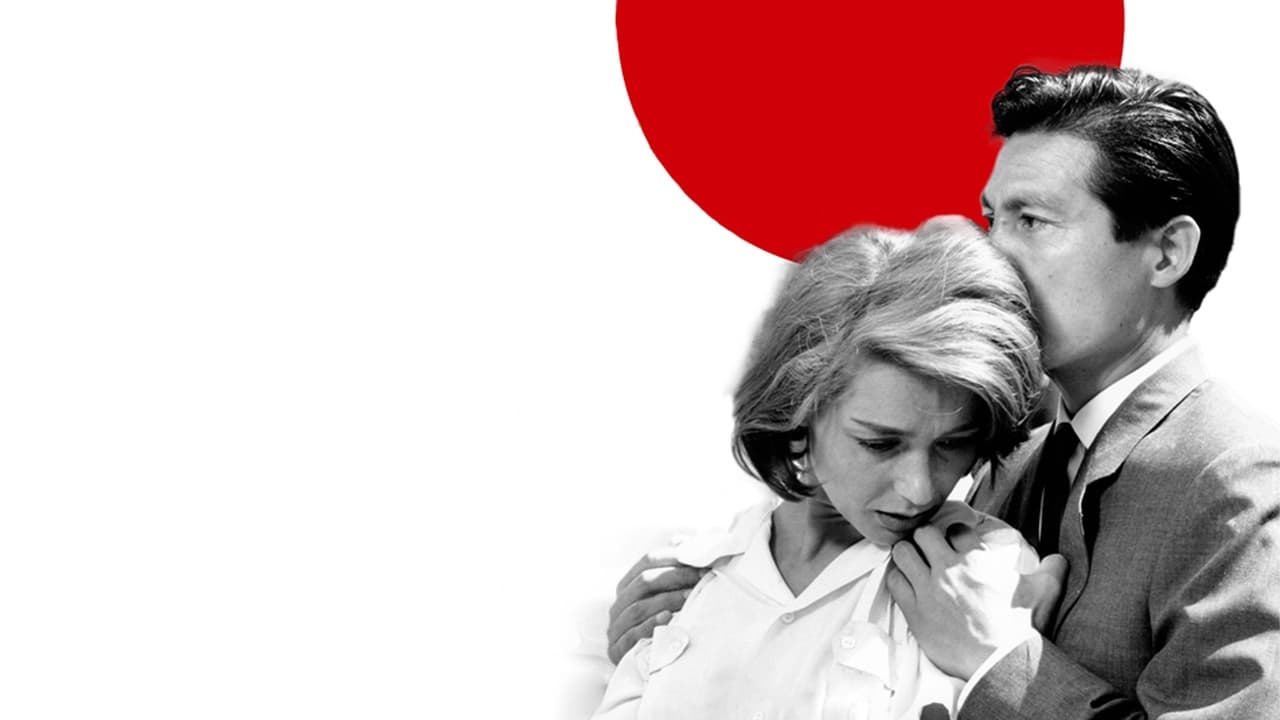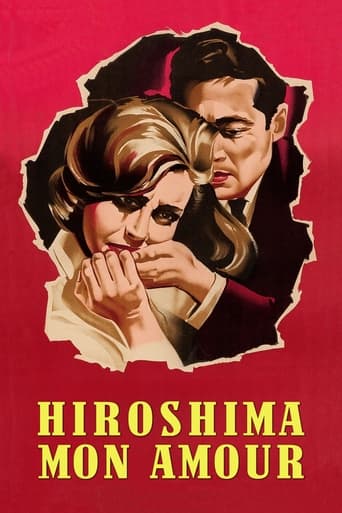

Hiroshima MON AMOUR is a romantic drama about lost love, war, wishes and concerns. A French actress has came to Hiroshima to shoot a film about peace. She begins an affair with an architect. One passionate night has revived their war trauma from the past... The protagonists, which are lost in their strong emotions, are nameless. Confusing repetition of words and desires have connected two souls. They are investigating wartime past and her first love. The pace is rather slow. Unclear story was interrupted by sudden flashbacks. Scenery is a sort of contrast between the destroyed and reconstructed city. Death, disease, suffering and pain were replaced by love and memories. A love, that has trapped in the past, has escaped to the surface. A short and intense romance was compared with a strong wartime love. The protagonists were torn with an internal conflict between loyalty and indecision. Emmanuelle Riva as Elle (She)is a pale, gentle and concerned woman. Her world has collapsed in her war youth. She attempts, through a brief romance, to revive her severe war past. Eiji Okada as Lui (He)is confused lover, who has tried to understand the new situation. He is a man who feels love around him while it slowly escapes from him.Stay? Leave? Try? Lots of questions. There is no answer. However, Mr. Resnais has, trough a common contrasts, flashbacks and non-linear narrative structure, made a very good movie.
... View MoreMemory is something that everyone has, everyone forgotten something that they didn't want to forget, and some try to ignore and forget this memory, happy or sad, she always comes back and consume us altogether. A married French actress spending her last day in Hiroshima as she completes her participation in a film about peace, and at the same time she has a romantic relationship with a married Japanese architect, that reminds her of a tragic love she had during the war, as they wait for time to pass and separate them painfully, she tells him the story of her tragic love. War and memory are intertwined poetically, beautiful and painfully as the protagonists at the beginning of the film, the tragic past of Hiroshima is also intertwined with the tragic past of this woman in Nevers, a French town, although these cities seem so different, in the view of the protagonist these cities are nearly identical to her, because it evokes on her a pain and the memory of a war, Hiroshima could be Nevers, Paris, New York, Rome, any city in the world, Alain Resnais and Marguerite Duras (the director and the screenwriter of the film)shows that people have forgotten the true meaning of Hiroshima, people remember the city as a tragic scenario of an unfair fate, but forget why it was built: the love. The bodies of our protagonists intertwine and love, as was shown in opening, as well as their cities and their past, collective and individual, everything is intertwined and becomes one thing in Hiroshima. The couple's love is beautiful and intense, causing the viewer to sympathize the most with these characters, even if their names are never revealed, the personal tragedy of the protagonist is shown intensely by Emmanuelle Riva, it expresses all of her pains and torment of her memory while her lover is somewhat overshadowed,but he is a lot present as a character. The black and white of this film is excellent especially today, since it refers to a past,the past becomes present, the present becomes beautiful but painful and the future becomes uncertain. The script of the movie is perfect, it shows painfully, beautiful and sentimental way the past and the memory, everything contributes this film to be one of the greatest achievements in film history, and impressively, Hiroshima mon amour remains a beautiful and original film and quite possibly will never become dated as memory, love and unfortunately the war will always be present in some form in our present or future everyday.
... View More***User reviewer Ed Uyeshima ("Haunting, Sometimes Exasperating Rumination of a Love Affair Infused with Tragic Memories", Ed Uyeshima from San Francisco, CA, USA, 24 January 2007) has a good review with good background information.***"Hiroshima, Mon Amour (1959, Alain Resnais)", a tale of two cities, is profound. It is hard to believe that this is the first film by Resnais, as it is filled with insight about the human condition. It also reveals the confidence of the young director, as the nonlinear stream of consciousness experienced by a pair of adulterous lovers can only retain interest if the imagery is superb. Despite its plot- less, "arty" feel, "Hiroshima" is very compelling.Set in the 1950s, Elle (Emmanuele Riva) is a French actress in town to make an anti-war film. She has met Lui (Eiji Okada), a Japanese architect who lost his entire family to the atomic bomb. The two are introduced to us naked and intertwined, and for several minutes we do not see their faces. During the opening sequence, she insists she experienced the aftermath of the Bomb, we see footage reenacting the horrors she is describing and he (correctly) tells her she was not there when it happened. One point that Elle stresses lingers: The Bomb brought the surface temperature of the Sun (10,000 degrees Fahrenheit) to the courtyard now named "Peace Square". Because of details like this, American audiences are not often reminded of what Hiroshima experienced on August 6, 1945. Liu, himself married, wants Elle to leave her French family behind and stay with him. While the two linger in public during early morning hours, he probes Elle for clues about her troubled past. Flashbacks reveal that Elle has never recovered from the death of her first lover, a German soldier. In the scenes where she meets the German for trysts, her face registers no indication that she comprehends why it is not proper to allow a member of an invading army to experience her feminine pleasures. She eventually suffers the same fate as other French collaborators; i.e., her hair is cut off and she is publicly shamed. Her parents also lock her up in the cellar for good measure. Losing her first love and being rejected by her entire community led the young woman to a nervous breakdown. More than a dozen years has gone by but Elle's mental stability is still diminished. Her madness draws Liu in; the more he learns the more attached he becomes.Some reviewers have expressed admiration with the juxtaposition of an attractive French actress coping with her own tragic past with the horrors of the atomic tragedy. It sure is a thought-provoking combination. Are Elle and Liu really stand-ins for Nevers, France and Hiroshima, Japan, respectively? Or are they both representing the opposite city? The premise (of the Marguerite Duras novel) encourages the audience to associate the cities with the lovers. However, it seems more fun to observe how often the storytellers make choices that do not serve the perspective of the "never forget Hiroshima" community. By cutting (or dissolving) away from the Hiroshima reenactments to the lovers going at it in a hotel room, the audience is being encouraged to detach emotionally from the anguished Japanese faces. By having a principal character who is mentally ill and falsely claims she personally witnessed the Bomb's aftermath, we detach even further from the central atrocity. This also is the effect of Liu providing very little information about his own family's destruction. While Resnais appears to hope the audience does not forget the Hiroshima blast, his leading characters invite the audience to let the history go. This is remarkably sophisticated storytelling."Hiroshima" has masterful elements. Resnais is excellent with the Black and White imagery. He also draws inspiration from his cinematographers (Michio Takahashi for the bomb scenes and Sacha Vierny for the scenes in Nevers, France). The music by Georges Delerue and Giovanni Fusco is very jazzy and cool overall. The actors playing the lovers are very good, with Emmanuele Riva the standout. This film isn't for everyone, but I think the 90 minutes watching this hypnotic tone poem is wonderfully spent.Cinephiles know they can't miss this. Film buffs having their own adulterous affairs are encouraged to meet their current lover at the revival theater showing this excellent film. (Just make love somewhere else.)
... View MoreWhat a super film. The magic sets in from the top with a lovely neoclassical score from Georges Delerue and Giovanni Fusco which surfaces throughout the film as added perfume. But this isn't some sort of layered, misty eyed romance. The story-telling is quite to the point, the only overlap coming as the words of Emanuelle Riva drift across from the present in post-nuclear blitz Hiroshima to war-time France and her bittersweet illicit love affair with.Love stories work best when they do not have a happy ending - such is The English Patient, Lovestory, Casablanca... indeed this 1942 film lends itself to the coda of the film where the cycle of falling in love and then walking away from it again perpetuates itself once more. The ardent but bitterly resigned Eiji Okada tells Riva that he wishes he had known her at her first flush of love, when the reality of the end of such an affair was still consigned in ignorance. The experience of the affair in the present and the love of the now-fixed past in conveyed brilliantly in familiar New Wave jump cuts, making connections between people and feeding the story slowly. In 1959 neon-lit nighttime Japan must have looked as alien as provincial France in the 1940s looks halcyon now.The film is carried by Emanuelle Riva, a beautiful, technically capable actress who has worked consistently throughout her career and is coming to prominence now, having just won a BAFTA for her role in Michael Haneke's Amour. 8/10
... View More